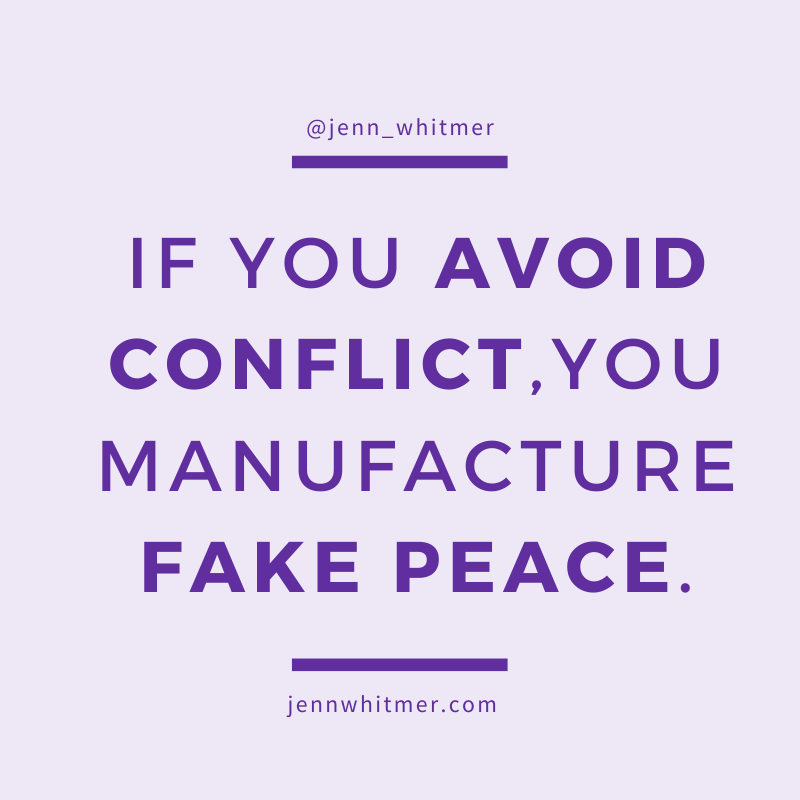No relationship escapes conflict. Anyone who tells you they have a conflict-free relationship is lying to you or themselves.
Avoiding conflict does nothing to address the root issue. Neglecting conflict results in deeper and bigger conflicts. You cobble together a fake peace that slowly causes a war, either with the original person, another person, or yourself.
Conflict doesn’t simply disappear like the fine morning mist!
There’s a working trio required in healthy conflict resolution. Conflict must be:
- Acknowledged.
- Addressed.
- Resolved.
There is a range of healthy responses to conflict, including discussion, confrontation, and mediation. But there is one response to conflict that should take up like half of the pie chart of healthy responses. And while it should be applied the most often, I see the most confusion and abuse of this healthy response: overlooking.
Neglecting conflict results in deeper and bigger conflicts. You cobble together a fake peace that slowly causes a war, either with the original person, another person, or yourself.
Most conflicts—I mean seriously, the vast majority—are just the complexity of being human in an imperfect world. Mistakes, missed timing, misunderstanding, miscommunication, missteps, missed sleep, missed meal, misinterpretation—so many misses!
Overlooking is not sidestepping a conversation. (I know you Enneagram Eights and Ones are squirming, but explore this for a bit.)
There’s some real work to do on the inside!
Overlooking doesn’t deny something happened. When we choose to overlook, we are acknowledging something is broken. It’s ok to say that hurt, or it’s annoying, or that caused me a problem.
Overlooking doesn’t avoid the issue. Overlooking addresses the offense intentionally and internally. Talk about it, assume the best about the other person, journal, think, ponder, feel all the feelings—all to yourself about it. Leave yourself a voice note, write yourself an email. Address the issue, just with yourself.
This is still a process full of authenticity and integrity, even if the resolution is all inside of you.
And then, as Elsa says, let it go. Open your hands, forgive, and release it.
For my Enneagram friends:
Ones, Twos, and Sixes: Ask yourself what you think about this? How can you assume the best about the other person’s intentions with logic? Use that to move toward forgiveness.
Threes, Sevens, and Eights: How do you actually feel about it? Even if it’s a mild emotion, feel the annoyance, frustration, hurt, or anger, no matter how illogical. Then release the other person from how you feel to forgive them.
Fours, Fives, and Nines: Make a conscious choice. Resist the urge to retreat and act on your forgiveness. Maybe even say it out loud.
When we overlook an offense, we don’t dwell on it, chew on it in my mind, or hold it against the other person. You can’t hold onto the offense and still walk together in relationship.
Holding onto an offense, not truly overlooking, is like walking around holding a bucket full of water above your head. It’s gonna spill out and mostly on you.
Wisdom is essential in choosing to overlook an offense. Overlooking does not work when the offense creates a wall in the relationship, when trust has been broken. Overlooking is absolutely not appropriate in cases of abuse.
We must address and refuse to overlook offenses that cause real harm (not just hurt) to you, the offender, or others. Humble confrontation becomes necessary when the offending behavior is patterned and repeated.
Holding onto an offense, not truly overlooking, is like walking around holding a bucket full of water above your head. It’s gonna spill out and mostly on you.
I have a free download for you with the three times it’s important not to overlook, when it’s time to have a caring confrontation. And a bonus on how to get that conversation started.
If you avoid conflict, you manufacture fake peace. Overlooking, applied appropriately, constructs genuine peace in a relationship.

COMMENTs:
0